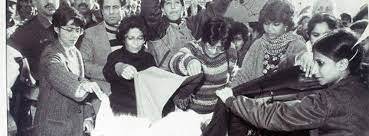
Although it is impossible to summarise the complexity of women’s resistance in Pakistan in a single text, let alone multiple volumes, the one word that comes to mind when recalling seven and a half decades of women’s resistance in Pakistan is, ‘glorious’.
From the monumental contributions of women to the Pakistan Movement itself, to the struggle for the restoration of democracy led by Shaheed Mohtarma Benazir Bhutto, and the contemporary articulation of feminism through the Aurat March, women in Pakistan have challenged patriarchy at every juncture.
It is also significant to note that women on the peripheries of class and ethnicity have braved some of the most violent forms of institutionalised discrimination, and yet stood their ground. When we write the story of women’s resistance in Pakistan, it is one filled with immaculate victories amid unjust and sometimes brutal persecution.
One consistency is that women’s rights have always been intrinsically linked with the preservation and promotion of democracy in Pakistan.
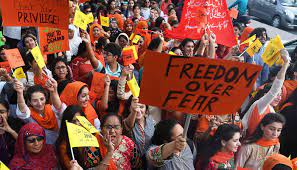
Earlier movements such as the All Pakistan Women’s Association (APWA), founded by Begum Rana Liaqat Ali Khan, focused on increasing the political representation of women and made interventions in education and healthcare. However, it was against the backdrop of General Zia ul Haq’s brutal and misogynistic regime, that the foundations of a more aggressive feminist struggle were laid.
As women became the primary targets of an authoritarian regime that sought to misuse religion for political ends and stifle basic democratic freedoms, an entire cadre of feminist resistance was born. It was during this time that Pakistani women took to the streets, rejecting paternalistic notions of honour and control.
Notable figures such as Asma Jehangir, who went on to become a champion for human rights, rose to prominence during this time.
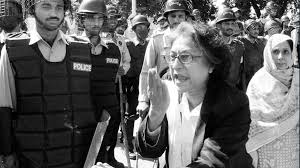
On the political front, it was Shaheed Mohtarma Benazir Bhutto who posed the strongest challenge to Zia’s regime. The symbolism itself that a young, dynamic and relentlessly brave woman became the face of resistance against a regime that personified bigotry and blatant chauvinism, is supremely powerful.
Thereon, democratic governments, in particular those led by the Pakistan People’s Party (PPP), have always sought to maintain collaboration with women’s movements. Consequential consultative dialogues have led to significant pieces of legislation ranging from sexual harassment, to domestic violence, and the overall socio economic uplift of women.
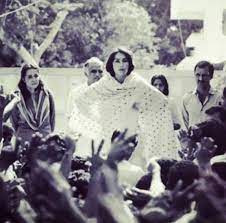
Although the women’s movement of the 1980’s was independent and non aligned, great synergy existed between the voices of women from civil society and those within political parties. This resulted in collaborative efforts to undo the assault on women’s rights once the elected political government was formed.
What we are witnessing today is in large part because of the resilience and excruciating bravery of female icons who resisted dictatorships and tyranny in the past but also contains elements of novelty amid a shifting local and global context.
Since 2015, a younger generation of feminists have emerged who are challenging patriarchy beyond legislation and engagement with the state. This ‘third wave’ of Pakistani feminism wants to call into question the very foundation of patriarchy which is rooted in a multiplicity of social and cultural institutions.
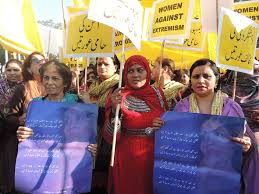
Amid the rising importance of social media, contemporary feminism encourages self-expression and links the experiences of women in homes, work places, public spaces to the broader issues of sexism. In this way, a new ‘everyday’ feminist resistance has emerged, where the personal has definitely become political. The placards which shake society on March 8th every year seek precisely to uncover how seemingly innocuous everyday gender roles and stereotypes have harmed women’s struggle for equality. Perhaps that is why they cause such great discomfort.
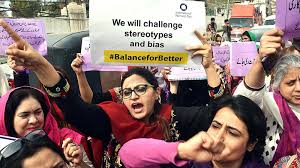
As I reflect on this history of glorious resistance, I feel a parallel sense of pride and disappointment. There is pride in knowing that women in every walk of life have struggled, persisted and that we are left with a wealth and treasure of stories of bravery.
However, there is disappointment that the patriarchy still requires women to offer such bold sacrifices for the mere recognition of equal rights and opportunities. It is the need of the hour for all political and social stakeholders to unite beyond their differences and put women’s rights on the national agenda with the utmost importance.
Our democratic journey can never be complete until each citizen is awarded equal rights. Pakistani women have made countless sacrifices in the path for democracy. We must not let them down.
From the monumental contributions of women to the Pakistan Movement itself, to the struggle for the restoration of democracy led by Shaheed Mohtarma Benazir Bhutto, and the contemporary articulation of feminism through the Aurat March, women in Pakistan have challenged patriarchy at every juncture.
It is also significant to note that women on the peripheries of class and ethnicity have braved some of the most violent forms of institutionalised discrimination, and yet stood their ground. When we write the story of women’s resistance in Pakistan, it is one filled with immaculate victories amid unjust and sometimes brutal persecution.
One consistency is that women’s rights have always been intrinsically linked with the preservation and promotion of democracy in Pakistan.

Earlier movements such as the All Pakistan Women’s Association (APWA), founded by Begum Rana Liaqat Ali Khan, focused on increasing the political representation of women and made interventions in education and healthcare. However, it was against the backdrop of General Zia ul Haq’s brutal and misogynistic regime, that the foundations of a more aggressive feminist struggle were laid.
As women became the primary targets of an authoritarian regime that sought to misuse religion for political ends and stifle basic democratic freedoms, an entire cadre of feminist resistance was born. It was during this time that Pakistani women took to the streets, rejecting paternalistic notions of honour and control.
Notable figures such as Asma Jehangir, who went on to become a champion for human rights, rose to prominence during this time.

On the political front, it was Shaheed Mohtarma Benazir Bhutto who posed the strongest challenge to Zia’s regime. The symbolism itself that a young, dynamic and relentlessly brave woman became the face of resistance against a regime that personified bigotry and blatant chauvinism, is supremely powerful.
Thereon, democratic governments, in particular those led by the Pakistan People’s Party (PPP), have always sought to maintain collaboration with women’s movements. Consequential consultative dialogues have led to significant pieces of legislation ranging from sexual harassment, to domestic violence, and the overall socio economic uplift of women.

Although the women’s movement of the 1980’s was independent and non aligned, great synergy existed between the voices of women from civil society and those within political parties. This resulted in collaborative efforts to undo the assault on women’s rights once the elected political government was formed.
What we are witnessing today is in large part because of the resilience and excruciating bravery of female icons who resisted dictatorships and tyranny in the past but also contains elements of novelty amid a shifting local and global context.
Since 2015, a younger generation of feminists have emerged who are challenging patriarchy beyond legislation and engagement with the state. This ‘third wave’ of Pakistani feminism wants to call into question the very foundation of patriarchy which is rooted in a multiplicity of social and cultural institutions.

Amid the rising importance of social media, contemporary feminism encourages self-expression and links the experiences of women in homes, work places, public spaces to the broader issues of sexism. In this way, a new ‘everyday’ feminist resistance has emerged, where the personal has definitely become political. The placards which shake society on March 8th every year seek precisely to uncover how seemingly innocuous everyday gender roles and stereotypes have harmed women’s struggle for equality. Perhaps that is why they cause such great discomfort.

As I reflect on this history of glorious resistance, I feel a parallel sense of pride and disappointment. There is pride in knowing that women in every walk of life have struggled, persisted and that we are left with a wealth and treasure of stories of bravery.
However, there is disappointment that the patriarchy still requires women to offer such bold sacrifices for the mere recognition of equal rights and opportunities. It is the need of the hour for all political and social stakeholders to unite beyond their differences and put women’s rights on the national agenda with the utmost importance.
Our democratic journey can never be complete until each citizen is awarded equal rights. Pakistani women have made countless sacrifices in the path for democracy. We must not let them down.

